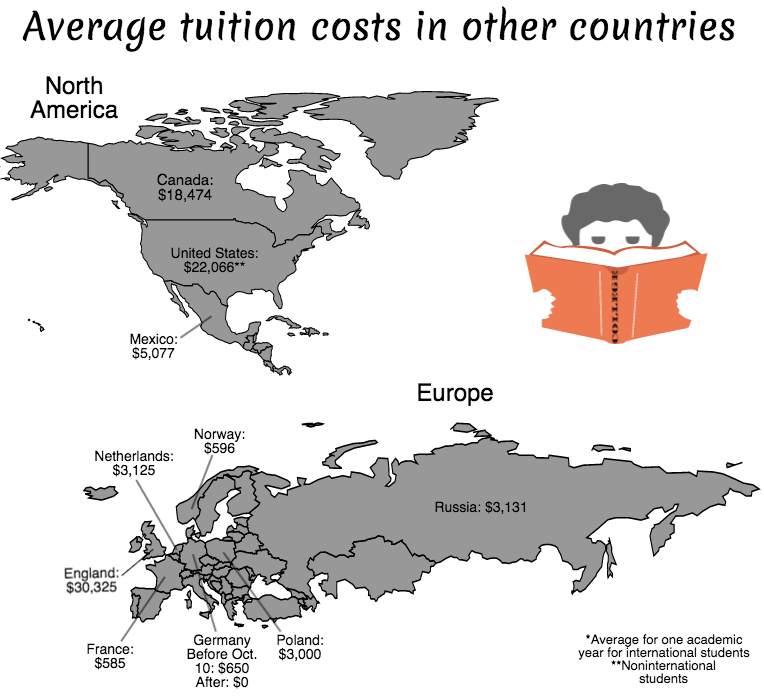Germany makes college tuition free
Students wonder why the United States can’t have affordable college costs.
Chart created using information from Business Insider, “Here’s What College Education Costs Students Around The World” June 8, 2012 by Adam Taylor and “America Is The Second Most Expensive Country In The World For International Students” Aug. 16, 2013 by Mandi Woodruff
November 5, 2014
There’s something so empowering about going through a college’s website and comparing what it offers to what type of education you want, examining its programs and checking out student life. For me, an out-bound senior, the process fills me with excitement.
Then I look at the price tag and my mood drops as quickly as it rose.
It’s no secret that American college tuition can be overpriced compared to other nations, especially those in Europe. The average 2013-2014 school year price for a “moderately expensive” public college in the U.S. was reportedly $22,826 a year compared to $19,291 in England for international students. In England students get their degrees in three years instead of four which makes the total cost for education lower than that of the U.S.
According to the Global Higher Education Rankings 2010, the Netherlands charged $3,125 per year for college. In Norway, one of the cheaper nations, college education cost was roughly $596.
The American cost goes down when scholarships and grants are added, but even those who qualify for financial aid can end up like Nathalie Acebes, former DPMHS student, who attends Mount Saint Mary’s University. She reports that her college tuition averages out to about $19,000 a year and might go up to $90,000 for all four years.
On September 30, Germany’s provinces officially became united in the policy of requiring students to pay absolutely nothing for their college tuition, the assorted costs of transportation and off-campus housing not included.
“It’s fantastic for them,” Acebes told me. “But it would be a blatant lie to say I’m not envious.”
Since the average cost is so high, getting into college in the U.S. has become, in many cases, a competition for scholarships to cover what grants can’t. Most students aren’t getting nearly enough of either, considering that the student debt in America reached $1 trillion as of 2012.
Under Germany’s new system, even foreign students (including Americans) now pay nothing. Which begs the question, why bother with American colleges at all when German college is free?
That said, packing my bags and moving to Europe isn’t exactly an option. Many nations currently only make cheap education available to residents of the nation. In the case of a dual Bachelor’s degree program with Columbia University and Sciences Po, a highly-ranked French college that I contemplated applying to before panicking at the price tag, only residents of the European Union have cheap education available to them.
Besides that, nations that do not have English as their primary language, including Germany, tend to teach in that language. It’s not every student who has the resources and the preparation to drop everything and move. Like most Americans, I’m stuck in the U.S. for college.
There’s a serious problem when students are contemplating jumping ship, citizenship-wise, because college is too expensive in their home country. This is a problem that needs to be addressed. If current statistics are anything to go by, America’s college system might soon cross an event horizon called “too expensive to function.”









